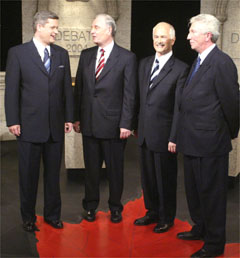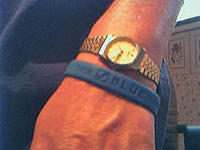I’ve been here almost ten years now, and I am just now starting to figure out elections in this country. It takes some getting used to.
First of all, you don’t vote here for Prime Minister like you would in the United States for President. No. The parties elect a leader, and then voters vote for the party whose leader they think can best lead. Or if they are mad at the party in power, they might vote for another party to punish the incumbent. It’s a game of chicken, really.
When the dust clears, you have a party that “forms the government” led by a leader, and that’s who becomes Prime Minister. But it might not be the party that got the most votes (like in the USA). And the party in power might not hold the majority of seats in Parliament (which is not a brand of cigarettes, but the federal legislative branch). In this case, you have a “minority government.” Some people find this reassuring, because Members of Parliament now have to work with one another and form coalitions to get things done. These people refer to this process as “cooperating.” Others find this alarming, because Members of Parliament now have to work with one another and form coalitions to get things done. These people refer to this process as “backroom deals.”
“So how often do you have elections?” I know you must be wondering. Guess what? It all depends!
An election must be held every five years, although traditionally they are held about every four years. But they can be held sooner. Apparently, if the party in power decides that they have a commanding lead they can call an election early, and then Parliament is dissolved and an election is held. Or, there can be a vote of no confidence, which means Parliament is dissolved and an election is held.
We had a Federal election in June 2004, and it looked as if we were headed for another one, somewhere between a year and a year and a half after the last one.

After a long tenure, Prime Minister Jean Chrétien stepped down and the Liberal Party chose his heir apparent, Paul Martin as party leader. Martin became Prime Minister --- but not as the result of an election, he just became Prime Minister.
So eventually, an election was going to have to be called as the five-year mandate would expire.
In June 2004, Canadians elected the Liberals, led by Martin. But the Liberals didn’t win a majority of the 308 seats in the House of Commons, so a minority government was formed. And has been hanging by a thread ever since.
Spring 2005 came and went, then summer. Finally in November the government fell! I had never seen that before. The CBC covered the event live. Everyone seemed remarkably calm.
Well, that’s not exactly true. Everyone seemed irritated that there would be election campaigning at Christmas. All the political parties blamed the other parties for “forcing a Christmas election.” On the news, everyone interviewed complained that there was going to be an election campaign over the Christmas holiday.
Last spring, everyone complained that a summer election would be an inconvenience because voting would interfere, somehow, with summer at the cottage. Last summer, a fall election would have been a mistake because it would interfere with … I can’t remember. The Grey Cup? (In an incredible demonstration of Canadian frugality, “The Grey Cup” is both the name of the Canadian Football League Championship game, AND the name of the trophy awarded to the game winner.) Now, apparently, the holiday plans of all Canadians lie in tatters because on January 23, they will have to go somewhere and vote.
Not MY holiday plans! I have the Christmas lights up outside, and next week we’ll have the Christmas tree up. By the time January 23 rolls around, maybe I’ll have had enough election campaign that I can complain about it interfering with The Superbowl. You know, the football game where the Vince Lombardi Trophy is awarded to the winner.











